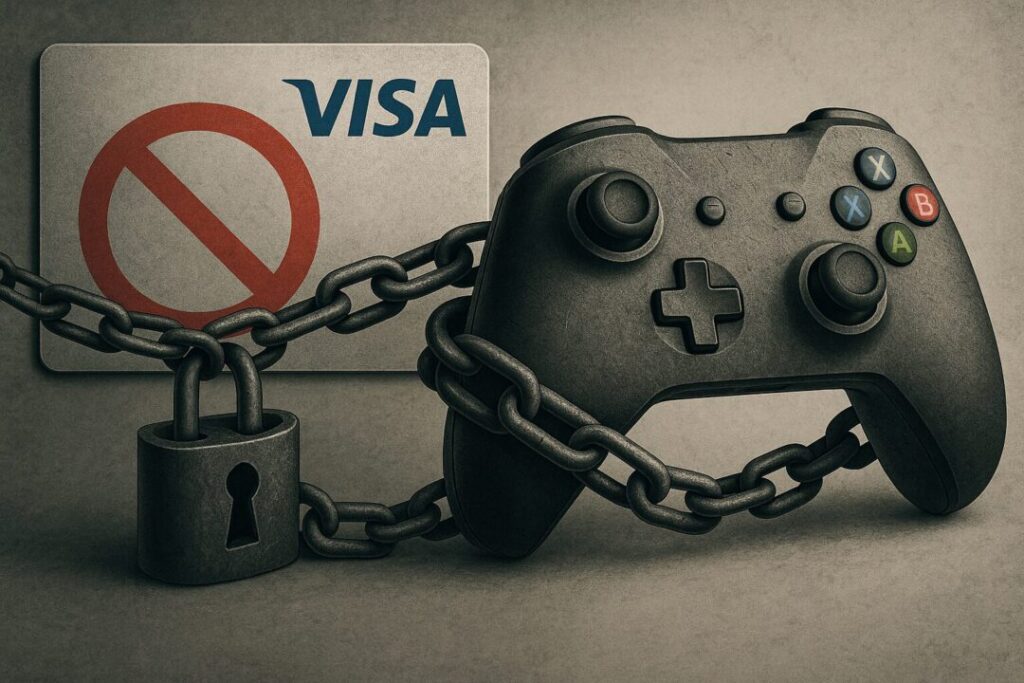Earlier this month, over 100 titles were suddenly removed from the popular gaming platform, Steam. Users found that many games had simply vanished, without warning or explanation.
So what happened? Did Steam decide to clean house? Were customers complaining?
Nope. It wasn’t the players. It wasn’t even Steam who made the first move.
Turns out, the real pressure came from behind the scenes – from the folks handling your credit card payments.
Not About Safety. All About Control.
Steam, the largest digital gaming store in the world, updated its developer rules this month. Now, game creators can’t upload anything that goes against the “standards” of payment processors like Visa, Mastercard, or PayPal.
The wording is vague, but the message isn’t; if you want to sell a game, it better pass the credit card companies’ smell test.
It’s not just about over-the-top content either. Some of the removed games included serious stories about domestic abuse, eating disorders, and other sensitive topics.
They weren’t pornographic. They were just… uncomfortable. And now they’re gone.
Why? Because the payment processors said so.
Some people who had already purchased these more adult-themed games discovered they were suddenly inaccessible or marked as “retired.”
Valve didn’t issue refunds. Instead, developers were offered credits to publish future games – but not cash back to players.
Steam’s usual refund rules still apply: if you bought a game within 14 days and played it for less than two hours, you can ask for a refund. Outside that window? Seems like you’re outta luck.
No special policy was announced, and Valve hasn’t guaranteed anything for those caught in the middle.
Follow the Pressure Campaign
An Australian activist group called Collective Shout claims credit for this whole mess.
They launched a campaign earlier this year to pressure Visa and Mastercard into cutting ties with any platform that hosts adult content they find offensive. Steam got caught in the crossfire.
Once the payment companies signaled they might pull out, Steam updated its rules almost immediately. Same story at Itch.io, another popular game site. Thousands of indie games (some barely PG-13) were removed or hidden overnight.
No one claimed these games were illegal. It wasn’t even about customer complaints. It was corporate censorship dressed up as “brand protection.”
Adults Deserve the Right to Choose
Not everyone wants to play adult games. That’s fine. But adults should be allowed to decide what they want to spend their money on, as long as it’s legal and no one is being harmed.
Video games, just like movies and music, come with age ratings and content warnings. If something’s not for you, you can skip it.
What’s happening now is financial middlemen deciding what you can and can’t buy, even if the government hasn’t said a word.
A Dangerous Precedent
If Visa and Mastercard can blacklist certain games because of sex or controversial themes, what stops them from going after violent games next? Or political ones? Or anything else someone finds offensive?
That’s the power these companies have. They don’t need a court ruling. They don’t need a vote. They just threaten pull the plug and whole platforms fall in line.
Who’s Next?
Even some developers who followed the rules are getting hit. Games with controversial character types or storylines are being deemed “sensitive”, even when there’s no nudity or sex.
That’s not moderation. That’s overreach.
If we let unelected corporations decide what’s allowed in art, storytelling, and entertainment, we lose a whole lot more than just a few weird games.
Bottom Line
You might not care about adult games; maybe you haven’t really thought about the fact that they even exist.
But this isn’t just about what’s in a game. It’s about who gets to decide what’s allowed in the marketplace.
Right now, that power is sitting with companies like Visa and Mastercard; not with voters, not with lawmakers, and definitely not with customers.
That should concern all of us.
We don’t ban R-rated movies. We don’t pull explicit songs off Spotify. At least, not yet.
Today it’s video games. Tomorrow? Who knows.
This article was written with the assistance of AI. Please verify information and consult additional sources as needed.




